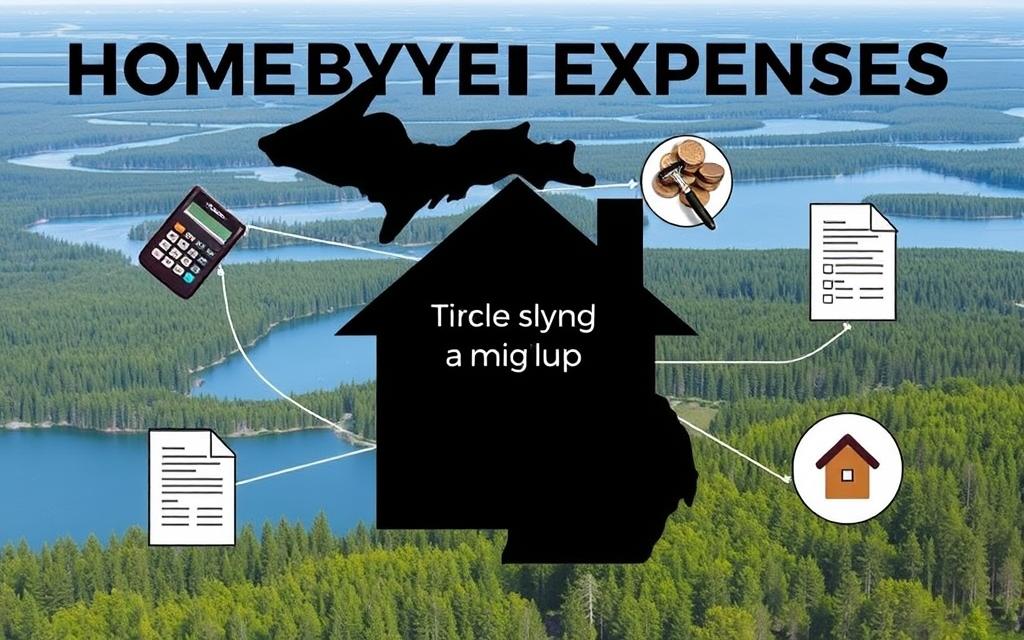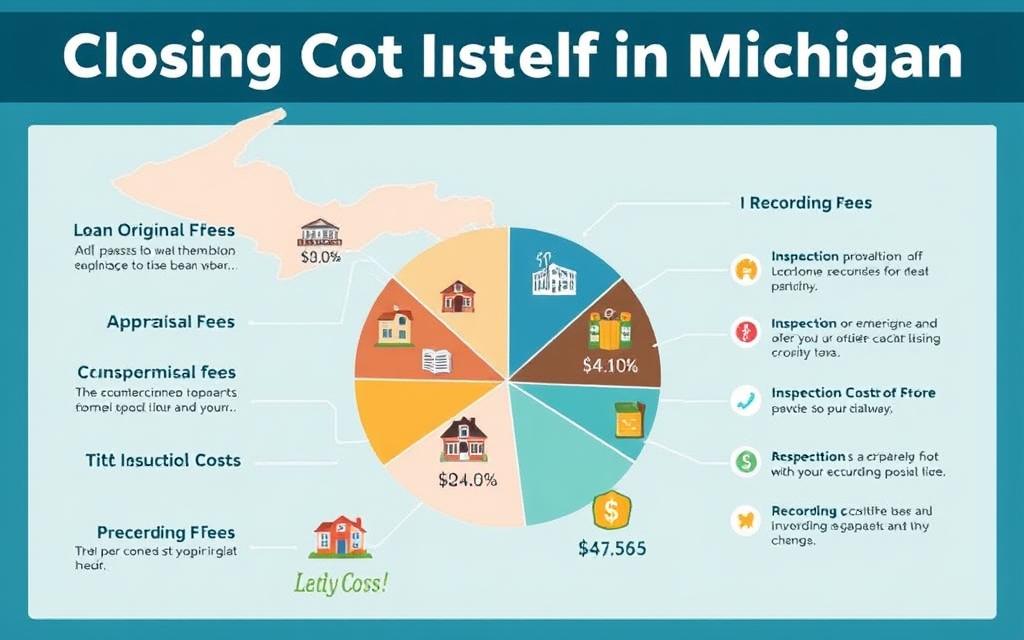Understanding Closing Costs in Michigan
In Michigan, closing costs can reach over $7,000 for a home priced at $259,500. CoreLogic’s ClosingCorp says these costs are about 2.7% of the home’s price. Knowing these costs is key for anyone buying or selling a home. They cover fees needed to transfer property ownership.
Loan type, home price, and location affect closing costs. Understanding these can prevent surprises. Whether you’re buying or selling, knowing these costs helps make better decisions and eases the process.
Key Takeaways
- Closing costs in Michigan usually range from 2% to 6% of the home loan amount.
- For a $300,000 home loan, expect closing costs between $6,000 and $18,000.
- Sellers usually cover the real estate agent’s commission and transfer taxes.
- Buyers can ask sellers to help with closing costs, with limits based on the loan type.
- Knowing specific closing costs helps with financial planning for both buyers and sellers.
What Are Closing Costs in Michigan?
Closing costs are a big part of buying or selling a home. They include fees for finalizing the sale. Knowing about closing costs in Michigan is key for both buyers and sellers. These costs can add up to thousands of dollars.
Being informed helps me plan my budget better. This way, I can understand the total cost of buying a home.
Definition and Importance
Closing costs in Michigan include fees for buyers and sellers. These costs are usually 3% to 6% of the loan amount. For example, on a $200,000 mortgage, costs could be between $6,000 and $12,000.
Knowing about these costs helps me prepare financially. It prevents surprises at the closing table.
Common Factors Influencing Closing Costs
Many things affect closing costs in Michigan. The location of the property is a big factor. Costs can vary a lot between places like Ann Arbor and Kalamazoo.
The sale price also matters. Higher-priced homes have bigger closing fees. Different loan types can also change costs. For instance, FHA loans might include a mortgage insurance premium of 1.75% of the loan amount.
Understanding these factors helps me manage my finances better. It makes the home-buying process smoother.
Average Closing Costs in Michigan
Understanding closing costs in Michigan is key for real estate deals. Typically, these costs are about 2.7% of the home’s price. This is higher than in states like Ohio, Wisconsin, and Indiana. Knowing this helps buyers and sellers manage their finances better.
Statewide Average and Comparisons
Closing costs for buyers in Michigan can be between $4,500 to $13,000. This depends on the home’s price. Sellers usually pay 8%–10% of the home’s value, which can be $19,000 to $24,000. These numbers are important for understanding the financial side of buying or selling a home.
Impact of Home Price on Closing Costs
Home prices greatly affect closing costs. For instance, in Ann Arbor, costs can be over $12,000. But in Kalamazoo, they might be around $5,157. It’s vital to understand how home prices impact these costs for anyone in Michigan.
Typical Closing Costs for Homebuyers in Michigan
Buying a home in Michigan comes with various closing costs. These costs can add up fast. It’s key to understand them for a good budget.
Loan-Related Fees
Loan-related fees are a big part of closing costs in Michigan. These include loan origination fees, which are 0.5% to 1% of the loan. There are also credit report fees. These fees are important for my financial plan when buying a property.
Inspection and Appraisal Costs
Inspection and appraisal costs are also important. Home appraisal fees are between $250 to $400. This helps understand the property’s value.
Home inspections cost about $430. They are key to finding any issues with the house. This can affect my negotiations.
Insurance and Property Taxes
In Michigan, insurance and property taxes are also costs to consider. Homeowners insurance is often needed by lenders. The cost varies based on the property’s location and value.
Property taxes in Michigan are another expense. Many lenders require prepayment during closing. This ensures all costs of my home purchase are covered.

Typical Closing Costs for Sellers in Michigan
Selling a home comes with many financial tasks, especially closing costs for sellers in Michigan. These costs can cut into your profit, so it’s key to know what to expect.
Real Estate Agent Commissions
One big expense is real estate agent commissions. They usually take 5% to 6% of the home’s sale price. For a home priced at about $259,500 in Michigan, this means around $14,272 in commissions. It’s crucial to include these costs when figuring out your closing expenses.
Title Fees and Transfer Taxes
There are also title fees and transfer taxes to think about in Michigan. The transfer tax is $3.75 for every $500 of the sale price. Knowing these costs helps you figure out how much you’ll get from selling your property. Title search fees are between $50 and $250, and owner’s title insurance is about 0.5% to 1% of the property’s value.
Other Seller-Related Expenses
Other costs add up too. Home inspection fees are $300 to $350, and recording fees are about $30. You might also have to pay outstanding property taxes or HOA fees. It’s a good idea to talk to your realtor about these costs early on. This way, you won’t be surprised later. For more details on seller closing costs, check out this guide.
Who Pays Closing Costs in Michigan?
Knowing who pays closing costs in Michigan is key for both buyers and sellers. Each side has specific costs in this deal. Buyers usually pay more for mortgage-related costs. Sellers cover agent commissions and other fees.
Buyers vs. Sellers
In the buyers vs sellers game, buyers handle lender costs like title insurance. They pay 2%-5% of the sale price for closing costs. This includes home inspections to check the property’s condition.
Sellers pay 8%-10% of the sale price, mainly for agent commissions and property debts. In Michigan, transfer taxes are split, showing both sides share costs.
Negotiations in Closing Cost Allocation
Negotiating closing costs is crucial, especially with market conditions. Buyers might ask sellers to cover some costs, saving them money. In a competitive market, this can help buyers save more.
In a buyer’s market, sellers might pay some of the buyer’s fees to sell the property. Knowing this can help both sides negotiate better. For more on closing costs in Michigan, check out this resource.
Understanding Closing Costs in Michigan
Knowing about closing costs can really help when buying or selling a home in Michigan. Closing costs usually add up to about 2.7 percent of the home’s price. This is higher than in some other states. Knowing what costs are involved helps during the closing process.
Breakdown of Specific Costs
Closing costs include things like loan fees, appraisal costs, and insurance. For example, mortgage origination fees can be between 0.5% and 1% of the loan amount. Title insurance costs around $200 to $250 in Michigan. Understanding these costs helps me make smart financial choices.
Variability by Location
Where you are in Michigan can change how much closing costs are. In Ann Arbor, for a $465,000 home, costs could be $12,555. But in Kalamazoo, for a $191,000 home, costs are only $5,157. This shows how location affects closing costs in Michigan.
Negotiable vs. Non-negotiable Costs
In Michigan, some closing costs can be negotiated, like agent commissions and some lender fees. Real estate agent commissions are usually 5 to 6 percent of the sale price. But, state taxes like the transfer tax are not negotiable and must be planned for. Knowing which costs can be negotiated helps me save money.

How to Calculate Closing Costs in Michigan
Understanding closing costs is key for buying or selling property in Michigan. A closing cost calculator Michigan can simplify this by breaking down all costs. This makes it easier to see what you’ll need to pay.
Using a Closing Cost Calculator
Using a closing cost calculator helps me understand my costs better. It considers things like loan fees and appraisal costs. By just entering some basic details, I get a good estimate of what I’ll need to budget for.
Estimating Costs Based on Home Price
To estimate closing costs, I look at the home’s price. In Michigan, costs usually range from 2% to 5% of the home’s value. For example, a $150,000 home might cost between $3,000 and $7,500. This helps me plan and prepare for any extra costs during the deal.
Strategies to Lower Closing Costs in Michigan
Closing costs can be a big expense when buying a home in Michigan. But, there are ways to cut down on these costs. Knowing how to handle these expenses is key for homebuyers.
Negotiating with Lenders
Talking to lenders can help lower closing costs in Michigan. They might waive or reduce fees like origination or processing charges. By asking about these costs, I can find big savings that might be missed.
It’s crucial to ask for a detailed list of fees and question any that seem too high. Getting quotes from different lenders helps too. This way, I can find the best closing cost options in Michigan.
Exploring First-Time Homebuyer Programs
First-time homebuyers in Michigan can benefit from special programs. Local governments and non-profits offer grants and low-interest loans. These help with closing costs and down payments.
These programs can greatly reduce closing costs. They make owning a home more affordable. It’s important to look into these options and see if I qualify for any help.
Conclusion
Understanding closing costs in Michigan is key for homebuyers and sellers. These costs can be a big part of your budget, often between 2% to 5% of the home’s price. For a $200,000 home, this could mean paying $4,000 to $10,000.
Knowing the different fees helps in planning your budget better. This includes loan origination fees, appraisal costs, and inspection charges. These fees can add up quickly.
Local taxes and the type of loan also affect closing costs in Michigan. Sellers face their own costs, usually 1% to 3% of the sale price. Understanding all costs, like transfer taxes and title insurance, is crucial. This knowledge lets you negotiate better, saving money in the long run.
Being informed about Michigan closing costs helps you move through the homebuying or selling process smoothly. For more on financial aspects of housing, check out tiny house placement in Idaho. It can give you more insights.
FAQ
What are the typical closing costs in Michigan?
In Michigan, closing costs usually are about 2.7% of the home’s price. For a home priced at 9,500, this means over ,000. This includes fees needed to transfer the property.
How can I estimate my closing costs in Michigan?
Use a closing cost calculator for Michigan to estimate costs. A good rule of thumb is to calculate 2-7% of the home’s price. This gives a rough idea of what to expect.
Who is responsible for paying closing costs in Michigan?
Both buyers and sellers have closing costs. Buyers usually pay more for mortgage-related expenses. Sellers often pay more due to agent commissions.
Are closing costs negotiable in Michigan?
Yes, many closing costs can be negotiated. Buyers might get lower lender fees. In some cases, sellers can also cover some of the buyer’s costs.
What are some common loan-related fees in Michigan?
Loan-related fees include application fees and origination fees (0.5%-1% of the mortgage). Credit report fees also add up. These fees can increase closing costs a lot.
How do home prices affect closing costs in Michigan?
Home prices directly affect closing costs. Higher-priced homes mean higher fees. For example, in Ann Arbor, with a median home price of 5,000, costs can be around ,555. In Kalamazoo, with a lower median, costs might be only ,157.
What should first-time homebuyers in Michigan know about closing costs?
First-time buyers can look into financial help in Michigan. There are grants and low-interest loans from local governments and non-profits to cover costs and down payments.
What types of insurance costs are involved in closing in Michigan?
Buyers need to pay for homeowners insurance and prepay property taxes at closing. These costs can be high. They depend on the property’s value and location.
Are there options to lower closing costs in Michigan?
Yes, buyers can try to lower costs by negotiating with lenders. First-time homebuyer programs also offer financial help, making it easier to manage costs.
Can I negotiate real estate agent commissions in Michigan?
Yes, real estate agent commissions are negotiable. It’s wise to talk about these fees early to save on closing costs.







